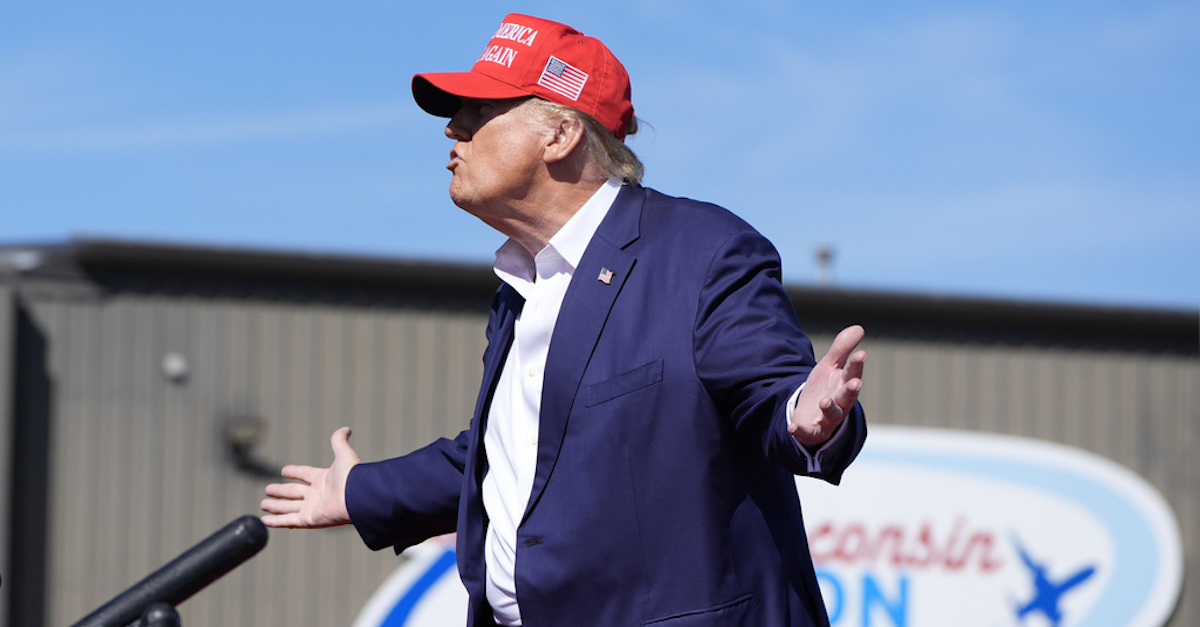
Republican presidential nominee former President Donald Trump gestures as he departs a campaign event at Central Wisconsin Airport, Saturday, Sept. 7, 2024, in Mosinee, Wis. (AP Photo/Alex Brandon).
A Donald Trump-appointed judge in Texas on Wednesday blocked the federal government from deporting certain Venezuelan migrants currently detained in the state under an 18th century wartime power without notice or due process.
U.S. District Judge Fernando Rodriguez Jr. granted a temporary restraining order barring the Trump administration from removing individuals accused of being members of the Tren de Aragua (TdA) gang under the Alien Invasion Act of 1798 (AEA).
Rodriguez issued his four-page order in response to a lawsuit filed by the American Civil Liberties Union (ACLU) on behalf of three Venezuelan migrants who had been slated for deportation to a notorious work prison in El Salvador under the AEA last month before a federal judge in Washington, D.C., blocked the measure. With the U.S. Supreme Court vacating that judge’s order on Monday, the plaintiffs alleged they are once again in immediate danger of being summarily deported, despite the justices unanimously holding that individuals subject to the AEA are entitled to due process.
“[S]ince the Supreme Court stayed that order on the basis that Petitioners had to proceed through habeas, Petitioners and others similarly situated to them are now all at imminent risk of removal,” the complaint states. “Although the Supreme Court made clear that individuals must now be given notice before they are removed pursuant to the Proclamation so they may challenge the government’s actions in court, the government has yet to explain what notice it intends to provide. That the government has yet to do so is especially problematic given the position it took prior to the Supreme Court’s ruling in the D.C. Circuit: ‘the government in no uncertain terms has conveyed that — were the injunction lifted — it would immediately begin deporting the petitioners without notice.””
Rodriguez reasoned that the plaintiffs had established that their removal under the AEA would cause “immediate and irreparable injury” as there was a substantial likelihood that if they were erroneously deported to El Salvador they would “not be returned to the United States.” The judge noted that in the case of Kilmar Abrego Garcia, who was deported “in error” last month, the Justice Department argued that the court “lacks the jurisdiction to compel the Executive Branch to return an erroneously-removed alien to the United States.”
“The Court finds that maintaining the status quo is required to afford the parties the ability to develop a fuller record for the Court to consider the request for a preliminary injunction and other forms of relief, as presented in the Class Petition for Writ of Habeas Corpus, and to prevent the immediate and irreparable injury that may occur with the immediate removal of any Venezuelan alien subject to the Proclamation,” Rodriguez wrote. “In addition, the Court finds that immediate and irreparable injury will result to the Petitioners before the Respondents can be heard in opposition, thus requiring the consideration and issuance of this temporary restraining order ex parte.”







